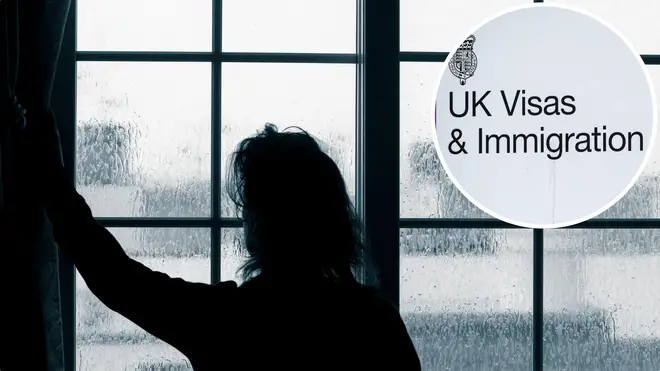
James Hanson 4am - 7am
20 October 2021, 13:57

Domestic abusers are using victims' immigration status as a tool of coercion and control - and the term "immigration abuse" should be recognised in national guidance, a new report warns.
Victims whose immigration status means they have no right to public funds are reluctant to report abuse because they fear the police will pass their details on to immigration enforcement - fears that are exploited by perpetrators who tell victims they will be deported if they report the abuse, according to Domestic Abuse Commissioner Nicole Jacobs.
"Having spent over 20 years working on the front line, I have sat with victims and survivors and their children as they desperately seek a place of safety, only to be told that their immigration status means there is nowhere to go," said Ms Jacobs.
"This cannot be allowed to continue."
Read more: Business Secretary Kwasi Kwarteng: Another Covid lockdown is “not going to happen”
Read more: Moment enraged mother drives into eco protesters as she tried to take son to school
She said the passage of the Domestic Abuse Act this year was a "critical step forwards", but those with no recourse to public funds (NRPF) will be "left out of this vital provision".
She added that the Government should give local authorities £18.7m over three years to help those with NRPF seek refuge, and a further £262.9m to fund specialist services including those for black and minority victims.

Journalist on police domestic abuse
Ms Jacobs said some migrant victims were forced to stay with their abusers or face destitution because of the lack of access to public funds.
She also said that some perpetrators purposefully destroy or withhold their victims' immigration documents, in order to use it as leverage.
She is calling for a firewall between agencies so victims can come forward without fearing their details will be passed on, and is also calling for the term "immigration abuse" to be included in the national definition of domestic abuse, and to be recognised in policy and guidance.
Read more: Net zero strategy could lead to more tax, Treasury warns
Read more: Government must enforce Covid 'Plan B' to avoid winter crisis, says NHS chief
The report, Safety Before Status, draws on research by the Angelou Centre as well as a review of Home Office evidence by the University of Suffolk.
"I could barely tolerate the abuse, but couldn't dare going to the police," one survivor said.
Another said: "I told him and his family I wanted to leave, and they told me if I did, I would starve because of my immigration status. That I have no rights in the UK.
"He kept throwing my card [visa] at me and telling me to read what it says at the back, that I can't get support."

Domestic abuse victims need more support through the justice system
One organisation told researchers: "We have to tell women who have risked everything and their lives to seek help 'I'm sorry but we can't guarantee that your data won't be shared or that you won't be deported'.
"How can we expect any women who are at risk of death to come forward?
"This is another reason why so many women remain in abuse."
Ms Jacobs said she is planning further research to calculate the number of domestic abuse victims with NRPF which will be published in 2022.